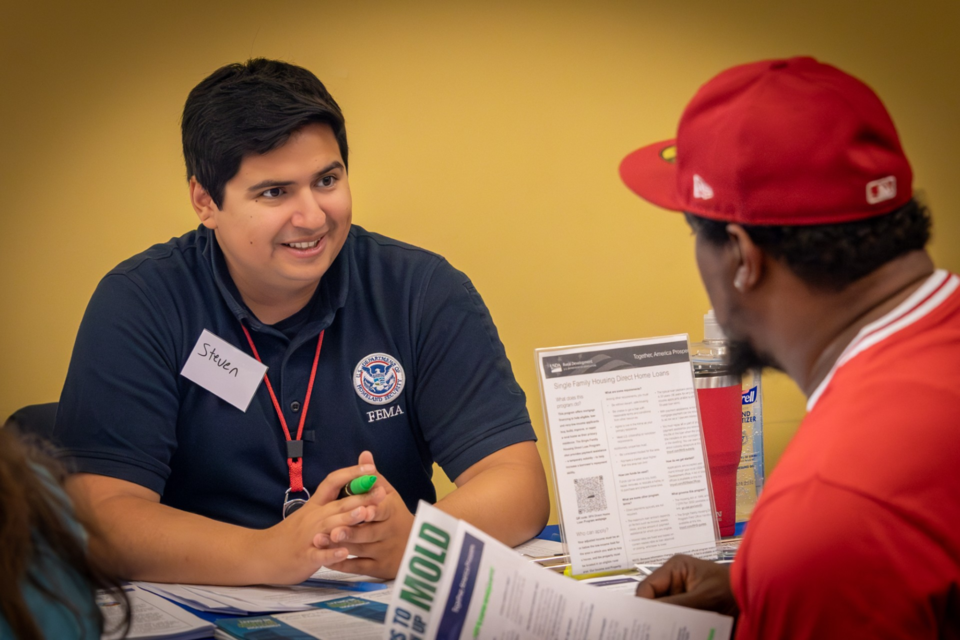As hurricane season approaches, FEMA encourages Georgians to visit Ready.gov and learn about disasters, low and no cost preparedness, build kits and creating a family emergency communications plan.
Stay in Touch with FEMA
FEMA may need to call you for more information or to continue processing your application for assistance after Tropical Storm Debby, Aug. 4- 20, 2024, or Hurricane Helene, Sept. 24- Oct. 30, 2024. If there are changes to your phone number, current address, banking or insurance information, please let FEMA know as soon as possible.
Disaster Assistance and Recovery
- FEMA is calling eligible survivors in Georgia regarding long-term housing solutions.
- These calls may come from unfamiliar area codes or phone numbers. It is important to answer the call because FEMA may be calling to help you with your immediate housing needs, provide you with additional assistance and give you general information about housing opportunities.
- Georgia farmers and ranch hands who applied for FEMA assistance are reminded they may be eligible for assistance replacing uninsured or underinsured disaster-damaged essential tools, supplies, equipment and items required for employment or for self-employment.
- Because these items are expensive, it is important to remember that assistance for these losses is limited to the maximum amount of Other Needs Assistance an applicant may receive. Additional assistance to help meet these needs may also be available from the U.S. Small Business Administration and the U.S. Department of Agriculture.
- The Disaster Legal Services (DLS) program provides free legal help to low-income survivors who were directly affected by Helene and cannot hire an attorney.
- Services typically provided include help with home repair contracts and contractors, insurance claims for doctor and hospital bills, loss of property, and loss of life, advice on problems with landlords, and FEMA appeals. For more information, visit Disaster Legal Services (disasterassistance.gov).
- As of May 21, FEMA has approved more than 402,711 applications for assistance and has approved more than $371.3 million in assistance to survivors for Hurricane Helene and Tropical Storm Debby
- This includes more than $11.7 million in rental assistance to more than 4,892 Georgia families. Additionally, to date, FEMA secured long term and temporary housing for nearly 365 families. We continue to reach out to survivors who may not have applied for assistance to let them know the housing options we can provide to them.
- FEMA has approved more than $559.4 million in Public Assistance to help communities remove debris and pay for management costs incurred by the state due to Hurricane Helene and Tropical Storm Debby. To date, more than 40.1 million cubic yards of debris have been removed.
Additional Federal Partner Assistance
- The deadline for U.S. Small Business Administration disaster loans for economic injury loans is June 30. Apply online at SBA.gov/disaster, by calling the SBA’s Customer Service Center at 800-659-2955 or by visiting a Business Recovery Center. You can also locate open centers on Locator Map - SBA BRC.
- Disaster Assistance Programs for Farmers, Ranchers: The U.S. Department of Agriculture’s Farm Service Agency offers physical loss loans for Georgia farmers. These loans can help producers repair or replace damaged or destroyed physical property essential to the success of the agricultural operation, including livestock losses. The deadline to apply is June 3. Visit Disaster Assistance Programs (usda.gov) to learn more.
Recovery Tips
- Permits Are Needed Before Rebuilding: Residents are reminded that if their home, business, or other structure was damaged by Tropical Storm Debby or Hurricane Helene, every part of a building requires a permit before rebuilding. A permit may also be needed for demolition.
- FEMA cautions survivors to be aware of post-disaster fraud and scams. Fake or unlicensed contractors may try to take advantage of survivors.
- Make sure the people you hire are authorized to do the work, will complete it and do a good job. Check for proper credentials. Contact the Georgia Licensing Board for General Contractors. FEMA does not certify contractors.
- Con artists may try to steal money or personal information through fraud or identity theft. All FEMA staff and housing inspectors carry official identification. Ask to see it. A FEMA inspector will never ask for your registration number. They already have it in their records. FEMA inspectors never require banking or other personal information such as a Social Security number.




